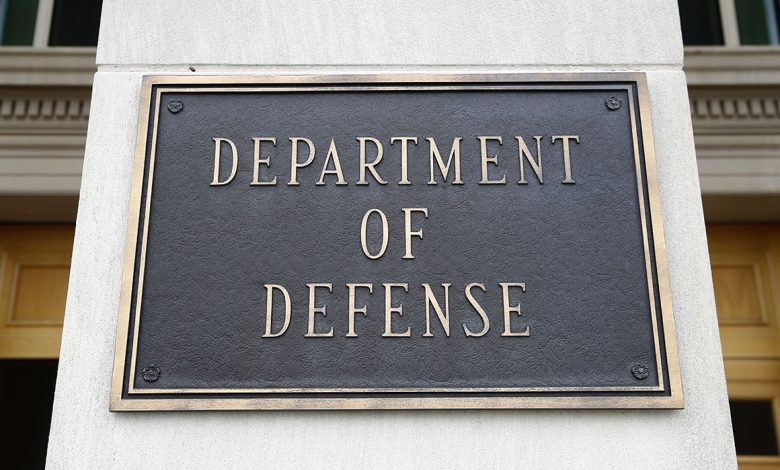Biden signs $768B defense policy bill that supersized his original Pentagon request

The bill rejects Biden’s $715 billion Pentagon budget request and instead calls for $740 billion for the Defense Department.
While Biden’s request amounted to a military spending increase above the current levels, Republicans quickly panned the blueprint as insufficient to keep pace with inflation and military advances by China and Russia. Most Democrats on Capitol Hill agreed, and both the House and Senate backed further budget increases in their respective versions of the defense bill.
In all, the bill authorizes $768 billion for national defense programs, which includes the Pentagon and nuclear weapons programs overseen by the Department of Energy.
But the defense policy bill only authorizes spending, and doesn’t actually allocate any money. Lawmakers must still strike a deal to fund the government for the rest of the fiscal year for the defense increase to become reality.
In the meantime, the Pentagon and other federal agencies are frozen at the previous year’s funding levels cemented under former President Donald Trump. For defense, that means total funding that is lower than even the level that Biden proposed, and that Congress rejected as not enough.
The authorized budget boost will translate into billions more for weapons procurement, including more planes and ships than the Pentagon requested.
Top Democrats have touted a variety of legislative victories in the final bill, including an overhaul of how the military justice system handles sexual assault and other related crimes. The final legislation also incorporates language, backed by Democrats, that bars private funding for cross-state National Guard deployments, except during natural disaster emergency responses.
“There’s a lot to be proud of in this bill,” House Armed Services Chair Adam Smith (D-Wash.) said in a statement. “Ultimately, this year’s NDAA focuses on what makes our country strong: our economy, diversity, innovation, allies and partners, democratic values, and our troops.”
Still, Republicans see the legislation as a conservative policy win based not only on what was included in the compromise bill, but also provisions that were scuttled in negotiations.
Despite Democrats controlling both chambers of Congress and the White House, the final bill received more votes from Republicans.
The top House Armed Services Republican, Rep. Mike Rogers of Alabama, praised the bill’s “crucial funding increase” and focus on competition with Beijing and Moscow.
“Our work is not finished. As we approach the new year, our nation faces unprecedented aggression and threats from near-peer adversaries, namely China and Russia,” Rogers said. “Combating these threats will continue to be our number one priority as we look ahead to FY23.”
In addition to seeing their proposed $25 billion budget increase adopted, GOP lawmakers cheered a provision that bars the military services from dishonorably discharging service members solely for refusing the Covid-19 vaccine.
Conservatives also scored a victory by torpedoing a proposal to require women to register for a military draft. The expansion of the Selective Service system was included in both House and Senate bills and backed by bipartisan majorities, but Republicans ultimately won the concession to strike it from the final deal.
Republicans also touted the exclusion of a proposal, sponsored by Rep. Anthony Brown (D-Md.) and backed by Democrats, that would establish a Pentagon office dedicated to countering extremism in the military.
The lack of more expansive anti-extremism provisions and a broader overhaul to the military justice system that removes commanders’ authority to prosecute all felonies — pushed by Sen. Kirsten Gillibrand (D-N.Y.) — was enough for some Democrats to oppose the final bill.
The White House also issued a lengthy signing statement, laying out Biden’s objections to implementing certain provisions, following the bill’s enactment.
Chief among Biden’s objections are provisions that bar the administration from transferring prisoners held at the Guantanamo Bay, Cuba, detention center to U.S. soil and to four other countries — Syria, Somalia, Libya and Yemen.
Provisions that hinder attempts to close Gitmo, as Biden has said he wants to do, have become annual features of the defense bill. But the White House criticized those provisions, arguing the limitations would make it more difficult to comply with court orders, “unduly impair” the executive branch from determining where to try detainees and constrain potential negotiations for detainee transfers with other countries.
“I urge the Congress to eliminate these restrictions as soon as possible,” Biden wrote.
Biden also noted a provision in the bill that provides the Pentagon with an exemption from the prohibition on the use of open-air burn pits in military contingency operations outside the U.S.
Biden, who has said he believes exposure to burn pits may have caused the brain cancer that killed his son Beau in 2015, said in the statement that he opposes the use of open-air burn pits and would request Defense Secretary Lloyd Austin seek his approval before using the exemption.
The administration also warned that several reporting requirements could force the executive branch to “reveal critical intelligence sources or military operational plans” to Congress. That includes provisions that require: a Pentagon notification to Congress in writing of any military cooperation or intelligence shared with the Taliban; a report on equipment and property that was left behind or destroyed in Afghanistan; and a report from the director of national intelligence on Iran’s military capabilities.
Biden said he’d comply with congressional reporting requirements but, citing previous executive practices, would do so in a way that protects classified information.
Source link




